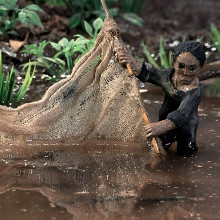The Missing Picture
Rithy Panh
No interviews with perpetrators and victims like in his earlier films S21 and Duch, but clay figures and found footage are the means by which Rithy Panh recounts his own history during the Khmer Rouge dictatorship. He has no other choice: besides the Khmer’s propaganda, there is no recorded material from that time.
Halfway through life, the images of our childhood return, explains the voice-over. And they are bittersweet. But Panh, almost 50, has to create them himself, because besides the Khmer’s propaganda, there is no recorded material from that time.
The voice-over is based on texts from Panh’s book The Elimination. We see a single photo cutout of brothers and sisters, from a happy time before Pol Pot’s troops stormed the capital with their ‘pure revolution’. But, the voice-over explains, it began with purity and ended with hate. Hundreds of clay figures stand frozen in landscapes as the camera wanders over them; silent witnesses filling in for those with a voice. Images like these raise questions about representation. If all historic images and reconstructions are fictitious, how to make a gruesome history comprehensible without resorting to bogus drama and sensation? What is the essence?
In 2001 director Rithy Panh won the award for Best Film at the Movies that Matter Festival.
Credits
- Director
- Rithy Panh
- Producer
- Catherine Dussart
- Year
- 2013
- Country of production
- Cambodia, France
- Duration
- 95 minutes
- Spoken language
- French
- Subtitles
- NL
- Production company
- Catherine Dussart Productions (CDP)
- World Sales
- Films Distribution
- Dutch distributor
- Contact Film
